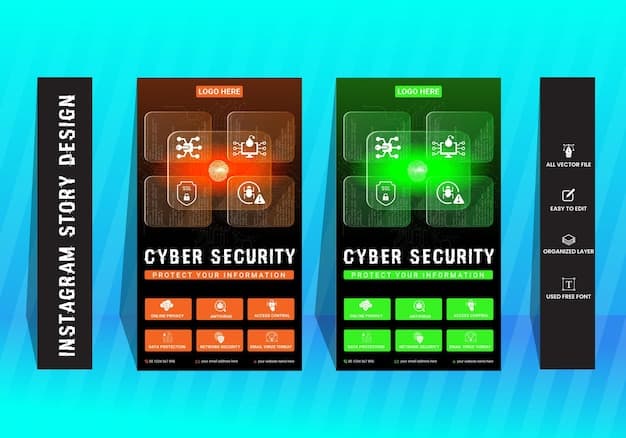Maximize Your Streaming: VPN Tips for Global Content in the US

Maximize Your Streaming Experience: Insider Tips for Using VPNs to Access Global Content in the US involves selecting the right VPN, understanding geo-restrictions, and optimizing VPN settings to securely unlock a broader range of movies and TV shows available on streaming services.
Are you tired of seeing the same old content on your favorite streaming platforms? Discover how to maximize your streaming experience: insider tips for using VPNs to access global content in the US, unlocking a world of movies and TV shows that you never knew existed.
Unlock Global Streaming: A Guide to VPNs in the US
Streaming services often limit content based on geographical location due to licensing agreements. This means that viewers in the US might miss out on fantastic films and TV shows available in other countries. A VPN (Virtual Private Network) can help bypass these geo-restrictions, but understanding how to use one effectively is key.
Understanding Geo-Restrictions
Geo-restrictions are digital boundaries that streaming platforms use to control what content is available in specific regions. These restrictions are in place to comply with copyright laws and distribution agreements.
How VPNs Bypass Geo-Restrictions
A VPN works by routing your internet traffic through a server in a location of your choice. This makes it appear as though you are accessing the internet from that location, effectively bypassing geo-restrictions and allowing you to access content that would otherwise be unavailable in the US.
- 🌍 Research which countries offer the content you want to access.
- 🛡️ Choose a VPN with servers in those countries.
- 📺 Connect to the VPN server and start streaming!
Ultimately, using a VPN is a powerful tool for unlocking global content, but it’s important to understand how it works and choose the right VPN provider to ensure a smooth and secure streaming experience.

Choosing the Right VPN for Streaming
Selecting the right VPN provider is crucial for a seamless streaming experience. Not all VPNs are created equal, and some are better suited for streaming than others. Factors like server speed, server locations, security features, and device compatibility all play a role in determining the best VPN for your needs.
Factors to Consider
When choosing a VPN for streaming, consider the following factors to ensure you get the best possible experience.
Top VPN Providers for Streaming
Several VPN providers stand out when it comes to streaming, offering fast speeds, wide server networks, and robust security features.
- 🚀 Speed: Look for VPNs with fast server speeds to avoid buffering and lag.
- 🌐 Server Locations: Choose a VPN with servers in the countries where the content you want to watch is available.
- 🔒 Security: Opt for a VPN with strong encryption and a strict no-logs policy to protect your privacy.
In conclusion, choosing the right VPN involves careful consideration of your specific needs and preferences. By evaluating factors like server speed, server locations, security features, and device compatibility, you can find a VPN that unlocks a world of global content and enhances your streaming experience.
Setting Up and Optimizing Your VPN for Streaming
Once you’ve chosen a VPN, the next step is setting it up and optimizing it for streaming. This involves installing the VPN on your device, connecting to a server, and adjusting settings to ensure the best possible streaming experience.
Installation and Setup
The installation process typically involves downloading the VPN app from the provider’s website or app store and following the on-screen instructions. Once installed, you’ll need to log in with your account credentials.
Optimizing VPN Settings
To ensure the best possible streaming experience, it’s important to optimize your VPN settings.

Configuring your VPN properly can make a significant difference in your streaming experience. By selecting the right server, protocol, and adjusting settings, you can ensure a smooth and secure connection.
Troubleshooting Common VPN Issues
Even with the best VPN, you may encounter issues from time to time. Common problems include slow speeds, blocked content, and connection drops. Knowing how to troubleshoot these issues can save you a lot of frustration and keep you streaming uninterrupted.
Slow Speeds
Slow speeds are a common complaint when using a VPN. This can be caused by several factors, including server distance, server load, and your internet connection speed.
Blocked Content
Sometimes, even with a VPN, you may find that certain content is still blocked. This can happen if the streaming service detects that you are using a VPN or if the VPN server is blacklisted.
- 📍 Try switching to a different server location closer to the content’s origin.
- 🔄 Clear your browser’s cache and cookies.
- 🕵️ Contact your VPN provider’s support team for assistance.
Troubleshooting VPN issues can be frustrating, but with a little patience and the right knowledge, you can usually resolve most problems and get back to streaming your favorite content.
The Legal and Ethical Considerations of Using VPNs
While using a VPN to access geo-restricted content is generally not illegal, it’s important to be aware of the legal and ethical considerations involved. Streaming services have terms of service that prohibit the use of VPNs, and violating these terms could result in account suspension or termination.
Terms of Service Violations
Most streaming services explicitly prohibit the use of VPNs to bypass geo-restrictions. This is because they have licensing agreements with content providers that limit where their content can be shown.
Copyright Infringement
Accessing content that is not licensed for your region could potentially be considered copyright infringement. However, this is a gray area, as most streaming services are more likely to block VPN usage than pursue legal action against individual users.
Ultimately, the decision to use a VPN for streaming comes down to personal choice and risk tolerance. While the legal risks are minimal, it’s important to be aware of the potential consequences and make an informed decision.
Future Trends in VPN and Streaming Technology
The landscape of VPN and streaming technology is constantly evolving. As streaming services become more sophisticated in their efforts to detect and block VPNs, VPN providers are developing new techniques to stay one step ahead. Exploring these trends can help users stay informed and adapt their strategies for accessing global content.
AI and VPN Detection
Streaming services are increasingly using AI and machine learning to detect VPN usage. These technologies analyze user traffic patterns and identify anomalies that indicate the use of a VPN.
The Rise of Residential Proxies
Residential proxies are becoming a popular alternative to VPNs. These proxies route traffic through real residential IP addresses, making it much harder for streaming services to detect VPN usage.
As technology continues to evolve, it’s important for VPN users to stay informed and adapt their strategies for accessing global content. By understanding the latest trends and developments, you can ensure that you continue to enjoy a seamless and unrestricted streaming experience.
| Key Aspect | Brief Description |
|---|---|
| 🌍 Geo-Restrictions | Content availability varies by region due to licensing agreements. |
| 🛡️ VPN Selection | Choose a VPN with fast speeds, server locations, and strong security. |
| ⚙️ Optimization | Configure your VPN for best performance: server selection, protocols. |
| ⚖️ Legal Aspects | Be aware of terms of service and potential copyright issues. |
FAQ
▼
A VPN, or Virtual Private Network, encrypts your internet traffic and routes it through a server in a location of your choice. This masks your IP address, making it appear as though you are browsing from that location.
▼
Yes, it is generally legal to use a VPN in the US. However, streaming services may have terms of service that prohibit the use of VPNs to bypass geo-restrictions, so it’s important to be aware of their policies.
▼
Choose a server in the country where the content you want to watch is available. Also, consider server load and distance to ensure a fast and stable connection.
▼
If you experience slow speeds, try switching to a different server or protocol. If content is blocked, clear your browser’s cache and cookies or contact your VPN provider.
▼
Yes, some streaming services use sophisticated techniques to detect VPN usage. However, many VPN providers are constantly developing new methods to bypass these detection mechanisms.
Conclusion
Using a VPN to maximize your streaming experience: insider tips for using VPNs to access global content in the US, can open a world of entertainment possibilities. By choosing the right VPN, optimizing your settings, and staying informed about the latest trends, you can unlock a broader range of movies and TV shows while protecting your privacy and security.





